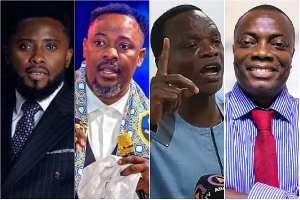Multi-party democracy has proven to be the most effective and viable system of governance all over the world. This is the system of governance that allows all shades of opinions to grow and flourish. This is in spite of the fact that opponents of multi-party democracy have argued against it, especially on the basis that it fosters tribalism.
Indeed political arrangements in most African countries are aimed at ostracising the evil of tribalism. Ghana as one of the leading lights in democracy in Africa has as part of its political arrangements said for example that before a political grouping is given a certificate to operate as such, it must show evidence of having an office in all the districts of Ghana. This has been deliberately made to ensure that no political party implants its roots in only one part of the country.
Prior to Ghana’s independence in 1957, Muslims and people of Northern extraction attempted to form political groupings based on their religiosity and ethnicity. The Muslims formed a party known as the Muslim Association Party (MAP). Muslims of the Zongo communities formed the MAP in early 1954 in order to consolidate their position in the Ashanti kingdom. It is significant to state that, Muslims in Ashanti had hitherto enjoyed a special status in the court of successive Ashanti kings as professional amulet makers and spiritual consultants.
Besides, with no more wars to fight between the Ashanti and the British colonial rulers, there was little need for this mostly migrant community. There was therefore the need to consolidate their positions and establish their legitimacy as bona fide Gold Coasters. In particular, a large number of Muslims resented the restrictions placed by the Convention Peoples Party (CPP) controlled municipal councils on Muslim traders in the markets.
The Northern Territories on the other hand under the leadership of J.A Braimah, also thought that their interest would best be guaranteed under their own political grouping. They therefore formed what was known as the Northern Peoples Party (NPP). According to the inaugural document, their aim of forming the NPP was:
To ensure that there is respect for the culture of the people of the Northern Territories. Their political and social development Their just treatment Their protection against abuses.
Both the MAP and the NPP were anti-CPP. Alfai Larden, the then chairman of the Kumasi branch of the party for example wrote: “True Muslims can never be friends with the CPP”. Unfortunately, both the NPP and the MAP performed woefully in the 1956 elections. In 1957, the CPP passed the Avoidance of Discrimination Bill which outlawed parties and political groupings based on religiosity and ethnicity.
Ever since, we have decided as a country to keep religion and ethnicity out of our body politic. Indeed northerners in particular have since the NPP debacle learnt to be more nationalistic than ethnic centered. Thus when the late President Hilla Limann formed the Peoples National Convention (PNC) and contested the 1992 election with the man who overthrew his democratically elected government, northerners overwhelmingly rejected their own in support of Jerry Rawlings.
Dr. Edward Mahama continued to suffer the same fate with his northern brothers. As for Professor Atta Mills’ fate in the Central Region, the least said about it the better. Thus from Hamile to Axim, the people of Ghana have shown their aversion for politics based on religion and ethnicity.
We need to emphasise competence, capability and experience rather than ethnicity in our body politic. For example after the collapse of apartheid the African National Congress (ANC) was divided between the returned exiles led by Thabo Mbeki (Oliver Thambo’s protégé) and those who fought apartheid from South Africa. Initially Mandela did not want Mbeki as his deputy (Vice President) after the 1994 election. Mandela feared having two Xhosas running the country so that they are not perceived as tribal.
He favoured Cyril Ramaphosa, a Venda, the popular former trade-union leader and ANC stalwart. In the end, others persuaded him (Mandela) to put Mbeki (leader of the other faction and a Xhosa) on the ticket.
Then in the United States of America in 1992, the Democratic Party against all expectations and predictions presented a double south ticket of Bill Clinton and Al Gore and defeated the incumbent Republican party that presented the traditional North/South ticket of George Bush Snr. (South) and Dan Quayle (North).
Indeed if we were to decide as a nation to conduct our political affairs based on religion and ethnicity, it will mean deliberately deciding that certain portions of our population be left out of political discourse in this country. The 2000 population census puts the religious divide of this country into 69.0% Christian, 15.6% Muslim and 8.5% Traditional. Across the regions of Ghana, the predominance of Christianity is observed except in the Northern and Upper East Regions. Indeed the only region in which Islam is reportedly dominant is the northern region.
With regards to ethnicity, the 2000 population census shows that the Akan are 69.1%, the Mole-Dagbani, 16.5%, Ewe, 12.7% and Ga-Adangbe, 8.0%. By these statistics, if we were to decide that we should conduct our politics on the basis of religion or ethnicity, then some of us especially Northerners and Muslims would be effectively left out of political discourse in this land of our birth.
I therefore find the creeping incidence of religion and ethnicity in our politics a very dangerous development. Certain candidates in the race for the flagbearership of the New Patriotic Party (NPP) have started to play the ethnic card in order to win the automatic allegiance of their compatriots. We all need to join hands to condemn this development. Lets remember what ethnicity has done to Rwanda and Cote D’Ivoire.
Besides, the directive principles of state policy as enshrined in our constitution makes it mandatory for governments to ensure the equitable distribution of the nation’s resources. Therefore no one ethnic group can under the pretext of alleged discrimination seek to make ethnicity the central plank of its political engagement.















